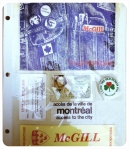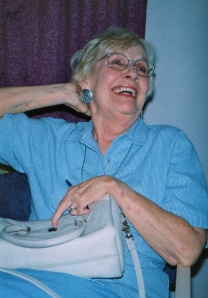[Clever allusion in post title explained here. Kinda.]
Today is Mother’s Day, a day I mostly loathe, perhaps because I’m not fond of commercially generated displays of rank sentimentality and perhaps because I resent that childless lesbians don’t get a special day set aside to honor their unique contributions to civilization. I mean, seriously, people, does softball mean nothing to you?
 Nonetheless: I was driving to campus the other day and caught a few minutes of a conversation on NPR’s Tell Me More about a new collection of essays edited by Elizabeth Benedict called What My Mother Gave Me: Thirty-One Women on the Gifts That Mattered Most. The conversation made the book sound far less rank than its title and cover might lead one to expect. The contributors are a diverse group of writerly women, including poet laureate Rita Dove, Nation columnist Katha Pollitt, and Genius grant-winning immigration activist Cecilia Muñoz. The essays clearly aren’t all saccharine and floral tributes to Saint Mom either. Some document fraught relationships with difficult women who weren’t always as present or functional as their daughters might have hoped or needed them to be, yet each writer came up with a particular gift from her mother that had, over the years, attained a special meaning and resonance: a wok, a quilt, a photograph, a necklace.
Nonetheless: I was driving to campus the other day and caught a few minutes of a conversation on NPR’s Tell Me More about a new collection of essays edited by Elizabeth Benedict called What My Mother Gave Me: Thirty-One Women on the Gifts That Mattered Most. The conversation made the book sound far less rank than its title and cover might lead one to expect. The contributors are a diverse group of writerly women, including poet laureate Rita Dove, Nation columnist Katha Pollitt, and Genius grant-winning immigration activist Cecilia Muñoz. The essays clearly aren’t all saccharine and floral tributes to Saint Mom either. Some document fraught relationships with difficult women who weren’t always as present or functional as their daughters might have hoped or needed them to be, yet each writer came up with a particular gift from her mother that had, over the years, attained a special meaning and resonance: a wok, a quilt, a photograph, a necklace.
Not surprisingly, the story got me thinking. I did a mental inventory of things my mother has given me over the past half century or so of our relationship. On my right hand, I wear a small diamond ring I got for Christmas my senior year of high school. In my dining room, I have the lovely gray Wedgwood that was the special occasion china of my childhood and a set of ruby red goblets that graced every holiday dinner table. In my study, I have Brit lit anthologies filled with notes in her neat high school teacher’s hand. She gave them to me when I started graduate school. As I write these words, I gaze up at a gray and white china rabbit on a nearby shelf. It was her mother’s, and she passed it on to me after Grandma died. Photographs? I have boxes full, just waiting for me to fulfill her wish for a proper family history.
These are all beloved objects, things I love having in my daily life and world. I cherish them and, if they are intended to be used, I use them, regularly. They are gifts that matter, deeply, yet none of them seems quite the right vehicle for taking up Benedict’s challenge to her contributors to describe a gift that “magically, movingly reveals the story” of my mother and my relationship to her (xii). I thought again, harder, letting my mind wander into places it doesn’t often go, not because those places are especially painful or tragic but because they are remote. I thought less of objects than of moments, turning points in my life when my mother had made a difference. And just like that, I knew how to identify the gift that mattered most.
The Plane Ticket
It must have been over the semester break, also in my senior year of high school, but I’m fuzzy on the timing. Still, it was winter and I had time to take a trip, so that would make sense. That year was strange for me — intense, as senior years tend to be, but weird because I wasn’t living with my family. My father had gotten transferred to a new job in a town about an hour away from where I attended high school. My parents gave me the option of staying behind, boarding with a friend’s family during the week so that I could graduate with my peer group. I was editor of the yearbook. I had a (gay) boyfriend. I had seen how hard similarly badly timed moves had been on my older brother and sister, so I opted to become a commuter kid. It was a good decision, but the arrangement added to the tumult of what is always a topsy-turvy period in one’s life.
In the midst of all this upheaval, I was also of course trying to figure out where to go to college. With all the editing and writing I was doing, everyone — myself included — had been assuming I was headed toward journalism school, perhaps at Indiana University, where my parents had met in the early 1950s and from which the grandmother with the china rabbit had graduated in the late 1920s. The summer before senior year, though, I spent six weeks in France in a language-immersion program. When I stepped off the plane in early August, I had a difficult time speaking English to my parents — and all my old plans and assumptions had been upended. I had been to a ballet, seen the Mona Lisa, picnicked in the shadow of the Eiffel Tower. I had visited tiny towns on the Norman coast, where grateful citizens still recalled being liberated by American troops in World War II. I had learned to tell jokes and to dream in another language. I had learned to love vegetables! Suddenly, Bloomington just didn’t seem big or glamorous enough, and I wanted more from college than a vocational training program.
 And so it was that at some point in December of 1976 or January of 1977 I found myself alone in Montreal, Quebec, checking out McGill University. I had never been to Montreal before, and I had never even heard of McGill until one of my pals in the study abroad program mentioned she was thinking about going there. “Wow,” said my impetuous young mind, “an English-speaking university in a French-speaking city known for its elegance and sophistication. Allons-y!” So I went, and of course I fell instantly and hopelessly in love. I remember nothing of campus tours or meetings with officials, though I’m sure I must have met with someone. (Remember, though, the whole campus visit industrial complex was a lot less complex in ye olden times of the 1970s than it is nowadays.) The highlights of the trip that I do recall were taking myself out for a dinner of crepes and wine and getting caught in a snowstorm that resulted in my flight home being canceled. I was already at the airport. I called home collect — remember: no cellphones! — to get advice on what to do. My mother gave me a credit card number and told me to take a cab back to my hotel. Because people were nicer and more trusting in ye olden times of the 1970s, I was able to check back into the hotel with nothing but a number on a piece of paper. I had one more deliriously happy night in Montreal and made it home the next day, determined to enroll at McGill. Which I did, for two years — but that is another story.
And so it was that at some point in December of 1976 or January of 1977 I found myself alone in Montreal, Quebec, checking out McGill University. I had never been to Montreal before, and I had never even heard of McGill until one of my pals in the study abroad program mentioned she was thinking about going there. “Wow,” said my impetuous young mind, “an English-speaking university in a French-speaking city known for its elegance and sophistication. Allons-y!” So I went, and of course I fell instantly and hopelessly in love. I remember nothing of campus tours or meetings with officials, though I’m sure I must have met with someone. (Remember, though, the whole campus visit industrial complex was a lot less complex in ye olden times of the 1970s than it is nowadays.) The highlights of the trip that I do recall were taking myself out for a dinner of crepes and wine and getting caught in a snowstorm that resulted in my flight home being canceled. I was already at the airport. I called home collect — remember: no cellphones! — to get advice on what to do. My mother gave me a credit card number and told me to take a cab back to my hotel. Because people were nicer and more trusting in ye olden times of the 1970s, I was able to check back into the hotel with nothing but a number on a piece of paper. I had one more deliriously happy night in Montreal and made it home the next day, determined to enroll at McGill. Which I did, for two years — but that is another story.
Why do I consider that plane ticket to Montreal the most important gift my mother ever gave me? And why do I think of the gift as coming from her when I know that my father was fully involved in this process? I suppose that particular ticket feels monumental because it was the first time I was sent out into the world on my own, to explore and evaluate a whole new set of possibilities and make my own judgment about them. When I came home and announced my decision, no one questioned it. No one said, “Oh, honey, why do you want to go so far away to school?” or “You know, they don’t even have a journalism program.” I made a decision, and it was respected and supported, every step of the way.
I credit my mother with the gift of the ticket because she was always the one who encouraged me to fly. I adored my father, but Mom pushed me to develop my skills and talents in ways that he didn’t. I realize there was a certain amount of vicarious living going on in her embrace of my big dreams, but I also think she recognized early on that I needed to chart my own course and that it was going to be quite different from hers. Not that my mother’s life was terribly thwarted or ground in the mill of the conventional. She had a husband and four children, yes, but she also had a demanding career, first in teaching and then in publishing. She set a high bar for accomplishment, and I’ve spent my life trying to get over it.
The finest gifts are always a reflection of both the giver and the recipient. They come out of deep desires and understandings; they meet deep, often inchoate, needs and open mind and heart to new ways of seeing, being, and thinking. With the gift of a plane ticket, my mother said to me, “Fly, my darling daughter. I know you can. I know you must. Fly away, and I will survive your absence. Fly back, and I will welcome you home. Fly, daughter, fly.”
Thank you, Mom. For the ticket to everything.




